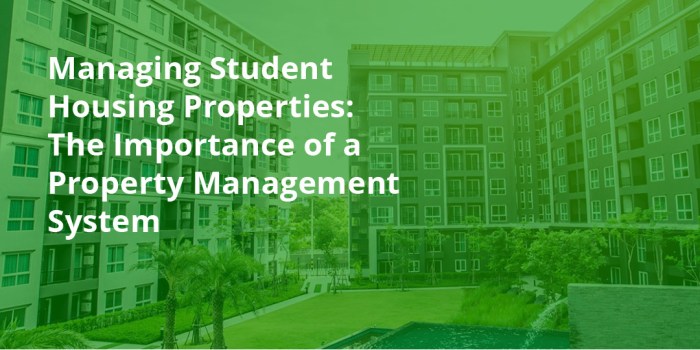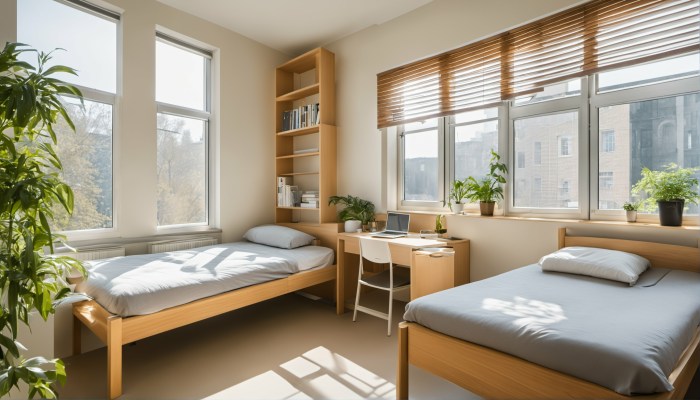Exploring Student Housing Property Management: A Comprehensive Guide
Student housing property management sets the stage for this informative guide, delving into the intricacies of overseeing properties that cater to the unique needs of students. From responsibilities to challenges, this topic offers a deep dive into a niche yet crucial aspect of real estate management.
As we progress, we will uncover the significance of effective management, delve into leasing and marketing strategies, and explore maintenance and facilities management specific to student housing properties.
Overview of Student Housing Property Management

Student housing property management involves the overseeing and operation of residential properties specifically designed for students. This type of property management requires a unique set of skills and considerations due to the specific needs and challenges associated with student tenants.
Key Responsibilities of Managing Student Housing Properties
- Marketing and leasing units to attract student tenants
- Ensuring the safety and security of the property and its residents
- Handling maintenance and repairs promptly to create a comfortable living environment
- Collecting rent and managing finances effectively
- Enforcing lease agreements and resolving tenant conflicts
Unique Challenges and Considerations in Managing Student Housing Properties
- High turnover rates: Student tenants typically stay for shorter periods, leading to frequent turnover and leasing challenges.
- Compliance with student housing regulations: Properties must meet specific requirements to cater to student tenants, such as safety standards and proximity to educational institutions.
- Dealing with noise and behavioral issues: Student tenants may engage in louder activities or parties, requiring effective management of noise complaints and behavioral policies.
- Seasonal demand fluctuations: Student housing properties may experience higher demand during the academic year and lower demand during breaks, requiring flexible leasing strategies.
Importance of Effective Management
Effective management in student housing properties plays a crucial role in ensuring a positive living experience for students. By implementing efficient management practices, property managers can greatly enhance the overall satisfaction and retention rates of the student residents.
Enhancing Student Living Experience
Effective management can create a conducive environment for students to thrive academically and socially. By maintaining well-kept facilities, addressing maintenance issues promptly, and fostering a sense of community through events and activities, property managers can contribute to a positive living experience for students.
- Regular maintenance: Ensuring that facilities are well-maintained and in good condition can create a comfortable and safe living environment for students.
- Quick response to issues: Addressing maintenance requests and concerns promptly demonstrates a commitment to student well-being and satisfaction.
- Community building: Organizing social events, study groups, and other activities can help foster a sense of belonging among residents, leading to a more enjoyable living experience.
Positive Impact on Student Satisfaction and Retention
Good management practices can directly influence student satisfaction levels and contribute to higher retention rates within student housing properties. When students feel valued, supported, and engaged within their living community, they are more likely to renew their leases and recommend the property to others.
- Increased satisfaction: Providing exceptional service and amenities can lead to higher satisfaction levels among residents, improving their overall living experience.
- Higher retention rates: When students are happy with their living arrangements and the management of the property, they are more likely to stay for the duration of their academic program, reducing turnover rates.
- Positive word-of-mouth: Satisfied residents are more likely to recommend the property to their peers, contributing to a positive reputation and attracting new residents.
Leasing and Marketing Strategies
Effective leasing and marketing strategies are crucial for student housing properties to attract and retain tenants. By implementing tailored approaches, property managers can ensure high occupancy rates and a positive reputation within the student community.
Tailored Leasing Strategies
- Offering individual leases for each bedroom in a unit, ensuring that each student is only responsible for their portion of the rent.
- Providing flexible lease terms to accommodate students' academic calendars, such as offering shorter leases for those studying abroad.
- Creating roommate matching services to help students find compatible roommates, reducing turnover and conflicts.
Innovative Marketing Techniques
- Utilizing social media platforms to showcase the property amenities, community events, and testimonials from current tenants.
- Partnering with local universities to promote the property to students during orientations and events.
- Implementing virtual tours and 3D floor plans on the property website to allow prospective tenants to explore the units remotely.
Comparison of Leasing Approaches
Traditional leasing approaches often involve flyers, newspaper ads, and physical signage around the property. While these methods can still be effective, modern digital marketing techniques have revolutionized the way student housing properties attract tenants. Digital marketing allows for targeted advertising, analytics tracking, and instant communication with potential tenants, leading to higher conversion rates and a more streamlined leasing process.
Maintenance and Facilities Management

Maintaining student housing properties comes with its own set of unique challenges. With a high turnover rate of residents and a tendency for wear and tear, effective maintenance and facilities management are crucial to ensure a positive living experience for students.
Maintenance Challenges in Student Housing
- Regular wear and tear due to high foot traffic and turnover of residents
- Issues with plumbing and electrical systems from constant use
- Damage caused by student behavior or lack of care
- Ensuring safety and security measures are up to date and functioning properly
Strategies for Efficient Facilities Management
- Implementing a preventive maintenance schedule to address issues before they escalate
- Utilizing technology for maintenance tracking and reporting
- Establishing clear communication channels for residents to report maintenance concerns
- Regular inspections to identify and address maintenance issues proactively
Proactive Maintenance Planning for Enhanced Student Living Experience
Proactive maintenance planning not only helps prevent issues from arising but also contributes to an overall positive student living experience. By staying ahead of maintenance needs, property managers can create a safe, comfortable, and well-maintained environment for students.
Ultimate Conclusion
In conclusion, student housing property management is a multifaceted field that demands attention to detail, innovative strategies, and proactive planning. By prioritizing efficient management practices, one can truly enhance the living experience for students and ensure high satisfaction and retention rates.
Top FAQs
What are the key responsibilities of managing student housing properties?
Managing student housing properties involves overseeing tenant relations, maintenance, lease agreements, and creating a conducive living environment for students.
How can effective management enhance the student living experience?
Efficient management can lead to prompt issue resolution, improved facilities, and overall satisfaction among student residents.
What are some innovative marketing techniques for attracting student tenants?
Utilizing social media campaigns, virtual tours, and student ambassador programs can be effective in attracting student tenants to housing properties.
How can proactive maintenance planning benefit student housing properties?
Proactive maintenance planning helps prevent issues, ensures the longevity of facilities, and contributes to a positive living experience for students.